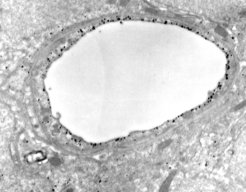Palmdelphin promotes the resilience of endothelial cells to mechanical stress

Our heart valves are mechanical top performers. They open and close with every heartbeat, up to 100,000 times per day, controlling the blood stream though our heart. The aortic valve is subject to the highest mechanical load. With age, deposits of calcium and cholesterol can be formed and impair its function. If the aortic valve is so severely tightened that it causes shortness of breath during exertion or even at rest, the only option for those affected is usually the surgical insertion of a valve prosthesis.
To date, three proteins are known to date to be involved in the development of aortic valve stenosis. One of them is palmdelphin. We have found that palmdelphin acts directly on endothelial cells. This cell layer covers the surface of the heart valves and forms the innermost cell layer of all blood vessels. Lack of this protein has a destabilizing effect on endothelial cells. As a result, they are less able to withstand mechanical stress from the bloodstream. Our results suggest that dysfunctional endothelial cells play a major role when an aortic valve stenosis develops. These observations improve our understanding of the disease processes of the heart valves. Our findings further indicate that palmdelphin plays a role in calcification not only of aortic valves but also of arteries.
